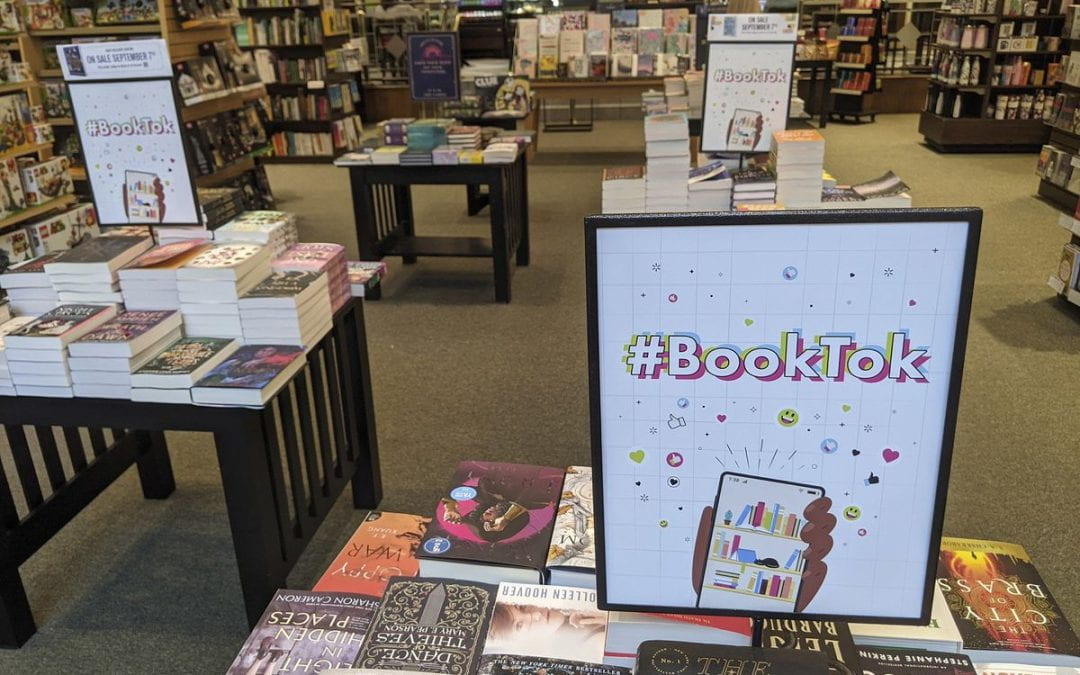Photo Credit: Bloomberg
It’s no secret that BookTok has consumed the publishing industry. From book reviews to live reactions while reading, to even cosplay. It’s an immersive way to connect with like-minded readers to share book recs and excitement over favorite stories. Authors such as Leigh Bardugo, Aiden Thomas, Adam Silvera, and E. Lockhart have all had their books skyrocket in sales due to the app.
“For authors, BookTok appears to offer tantalizing access to readers,” wrote Joanne O’Sullivan for Publishers Weekly. “The platform has launched new careers. Books going viral aren’t necessarily debuts or A-list books from big publishers.”
The best example of this type of success is Colleen Hoover, who has had her books on the bestseller list for months. She’s sold more books than the Bible and Dr. Seuss’s books combined in 2022, according to the New York Times.
Alex Aster is another example of BookTok’s influence. What started with Aster posting videos asking if people would be interested in reading her book led it to sell thousands of copies.
“Would you be interested in a book about three friends who live on a magical island, where everyone is born with symbols on their skin that represent their powers and futures?” reads the text of her TikTok.
In a duet with the previous TikTok, she reveals that Emblem Island: Curse of the Night Witch is one of Barnes and Noble’s most-sold books due to its popularity on the app. Her novel was initially released in 2020, with the sequel, Curse of the Forgotten City, published a year later.
With luck on Aster’s side, the same situation happened with her draft of a novel called Lightlark. The video blew up through BookTok and eventually led Aster to get a deal to publish it.
In March 2021, Aster posted. “Would you read a book about a cursed island that appears once every hundred years to host a game that gives the six rulers of the realm a chance to break their curses? Each realm’s curse is deadly and to break them…,” Aster wrote, “One of the six rulers must die.”
In May of that year, Aster shared that Lightlark was acquired by Harry N. Abrams. Her original video garnered 1.3 million views and over 7,000 comments asking to read it. The novel was released this past August.
With authors like Hoover and Aster achieving high success with the app, one would think it’s an author’s wonderland, with every author on the app obtaining some sort of cult following. While that might be the case for a select few, it is not that way for everyone.
Emma Berquist, author of Devils unto Dust explained in an interview with Publishers Weekly that the publishing industry has a problem with expecting unpaid work from everyone. “It’s only going to get worse as houses keep consolidating,” she said. “It feels like authors have no choice but to take on responsibilities that aren’t ours.”
Berquist asks an important question. Why should the author take on the forefront of marketing their book when there is a marketing department in publishing houses? Many authors do not have the skills to be adept in social media. Some dislike being on camera and tend to look awkward. Readers can tell when authors are not enjoying the social media presence they’re forced to have.
In fairness to publishers, they know not all authors are adept with social media. If current social media trends are not working when marketing a book, they leave it to the author to figure out the best way to connect with their readers.
BookTok itself is more of a space for readers than authors, anyhow. “We can do our part, but it’s a rare novelist who wants to be a video star, and an even rarer one who is especially good at it,” says Emily Lockhart. “I think it’s beautiful the way readers are finding each other and discussing literature on global social media platforms that engage their creativity the way TikTok does.”
It’s the readers who were the reason Lightlark sold over 25,000 copies in its first week on sale, and they’re the ones who keep Colleen Hoover on the bestseller list. Authors and publishers can only do so much to promote the book. Readers are the ones who make or break a novel’s success.

